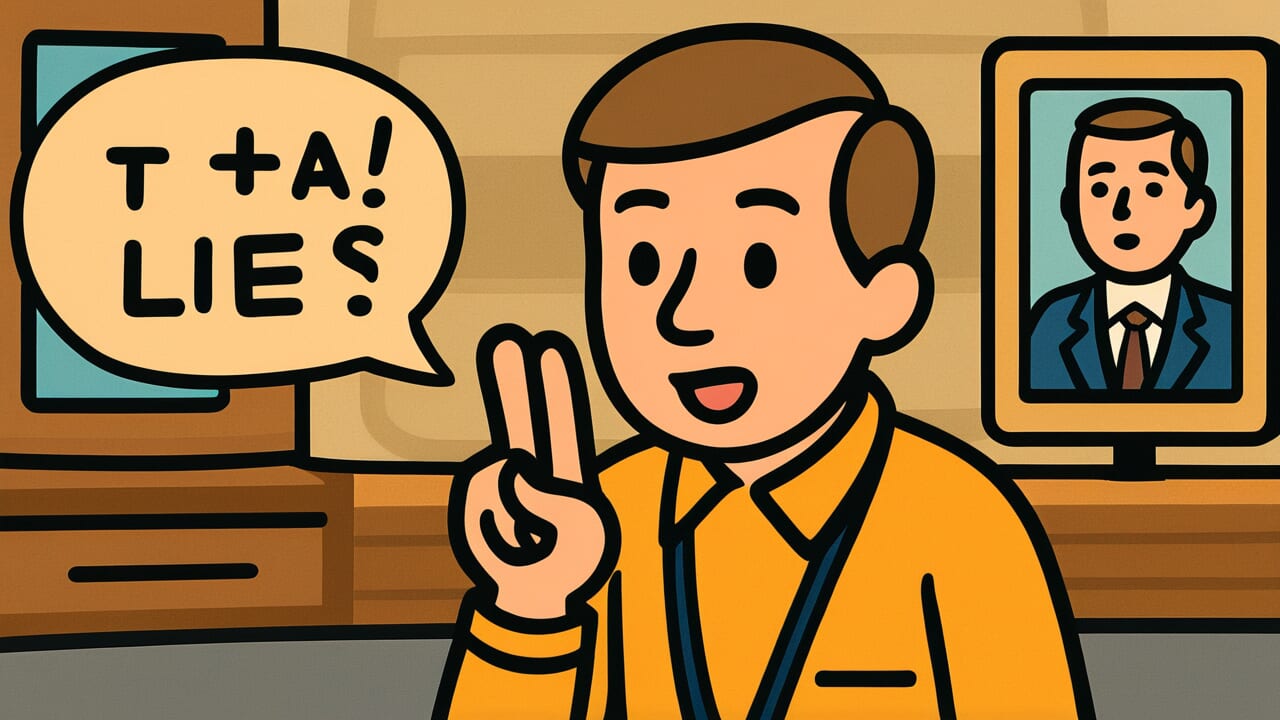How to Read “A master of talk is a master of lies”
はなしのめいじんはうそのめいじん
Meaning of “A master of talk is a master of lies”
This proverb means that people who are skilled at talking are also skilled at lying. People with excellent speaking skills know how to use words cleverly. They have the technique to move listeners’ hearts.
This technique can be used to tell facts in an interesting way. But it can also be used to make lies seem true.
This proverb teaches us to be cautious around eloquent people or those who tell interesting stories. It also warns speakers themselves not to misuse their speaking skills. Just because someone speaks well doesn’t mean what they say is true.
In fact, the better someone speaks, the harder it may be to spot their lies. This is an important warning about human relationships.
Even today, scam artists are often skilled speakers. People still get fooled by smooth talkers. Nothing has changed.
Origin and Etymology
The exact first appearance of this proverb in written records hasn’t been identified. However, we can make interesting observations from how the words are structured.
The word “meijin” (master) originally referred to someone with outstanding skill in arts or crafts. During the Edo period, storytelling arts like rakugo and kodan flourished as popular entertainment. A culture developed that highly valued skillful speaking.
People had many opportunities to observe the techniques of skilled speakers.
This proverb was born from sharp insight into the nature of speaking skills. To make a story interesting, simply telling facts as they are isn’t enough. You need various techniques: appropriate exaggeration, effective omission, and embellishment based on audience reactions.
In other words, a master of talk is someone skilled at “cleverly processing reality.”
People realized that this “skill of processing reality” is two sides of the same coin as “the skill of lying.” The embellishment used to make stories interesting and the lies used to deceive people use the same techniques.
This proverb was born from deep human observation that saw through this dual nature of speaking skills.
Usage Examples
- That salesman is smooth, but a master of talk is a master of lies, so we should check the contract carefully
- His presentation was excellent, but a master of talk is a master of lies, so we need to verify the data
Universal Wisdom
This proverb reveals a fundamental truth about human society: the dual nature of communication ability. Words are a special tool that only humans possess. But they are also the most dangerous tool.
Why are being good at talking and being good at lying connected? Because both are “techniques for moving people’s hearts.”
People skilled at talking excel at reading listeners’ emotions. They choose appropriate words and deliver them with good timing. This ability works equally well for effectively conveying truth or making people believe falsehoods.
Humans are social creatures who build trust through words. But the very tool that builds trust can also betray it. This contradiction is the eternal dilemma of human society.
Our ancestors saw through this danger. Don’t trust eloquent people unconditionally. Don’t be fooled by clever words. Develop the ability to judge whether content is true or false.
This proverb conveys this essential wisdom about human relationships in simple words. Know the power of words as a tool. Have the wisdom not to be controlled by that power. That’s why this proverb has been passed down through the ages.
When AI Hears This
Real-world events contain enormous amounts of data. For example, if you tried to completely record one hour of your experience yesterday, visual information alone would be several gigabytes. Include audio, touch, and smell, and it becomes astronomical.
But what humans can tell as a story is at most a few minutes, or a few thousand characters in writing. The speaker must compress the original information to less than one ten-thousandth.
What’s important here is that this compression is “lossy compression.” Just as JPEG images delete original photo data to become lighter, masters of talk also cut away massive amounts of information from reality. Which parts to keep and which to discard—this choice is the technique of storytelling and also the beginning of alteration.
Masters don’t just delete; they also “supplement.” To smooth the story flow, to clarify cause and effect, to make it easier for listeners to understand, they add conjunctions and emotional expressions that weren’t originally there.
Information theory proves that higher compression rates create larger errors during restoration. The more interesting a master’s story, the higher the compression rate, meaning greater deviation from reality. This is a technical necessity, not a moral issue.
A master’s lies are the result of trying to convey maximum information value within the constraints of limited time and human cognitive capacity.
Lessons for Today
This proverb teaches modern people about the responsibility of information receivers. In today’s society, where massive amounts of information flow through social media and news every day, the ability to distinguish between speaking skill and content accuracy is more important than ever.
Attractive presentations, moving stories, persuasive speaking styles—it’s natural to be moved by these. But develop the habit of pausing at that moment. Precisely because someone speaks well, you need to calmly verify their content.
At the same time, this proverb is a warning to yourself. If you have the power to speak, are you using that power honestly? The ability to persuade can be used for others’ benefit or for your own gain.
When you hold the tool of speaking skills, how you use it is a moment when your character is tested.
Become a wise listener and be an honest speaker. Maintaining this balance is the attitude this proverb asks of us living in modern times.



Comments